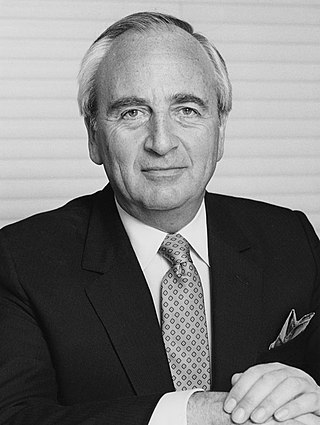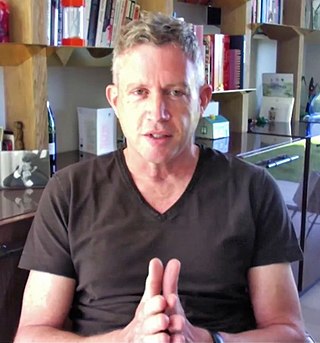
Sir Oliver Letwin is a British politician, Member of Parliament (MP) for West Dorset from 1997 to 2019. Letwin was elected as a member of the Conservative Party, but sat as an independent after having the whip removed in September 2019. He was Shadow Chancellor of the Exchequer under Michael Howard and Shadow Home Secretary under Iain Duncan Smith. He was Chancellor of the Duchy of Lancaster from 2014 to 2016.
Small and medium-sized enterprises (SMEs) or small and medium-sized businesses (SMBs) are businesses whose personnel and revenue numbers fall below certain limits. The abbreviation "SME" is used by international organizations such as the World Bank, the OECD, European Union, the United Nations, and the World Trade Organization (WTO).

David Ivor Young, Baron Young of Graffham, was a British Conservative politician, cabinet minister and businessman.
A social enterprise is an organization that applies commercial strategies to maximize improvements in financial, social and environmental well-being. This may include maximizing social impact alongside profits for co-owners.

The Prince's Trust is a United Kingdom-based charity founded in 1976 by King Charles III to help vulnerable young people get their lives on track. It supports 11-to-30-year-olds who are unemployed or struggling at school and at risk of exclusion. Many of the young people helped by the trust face issues such as homelessness, disability, mental health problems, or trouble with the law.

Social entrepreneurship is an approach by individuals, groups, start-up companies or entrepreneurs, in which they develop, fund and implement solutions to social, cultural, or environmental issues. This concept may be applied to a wide range of organizations, which vary in size, aims, and beliefs. For-profit entrepreneurs typically measure performance using business metrics like profit, revenues and increases in stock prices. Social entrepreneurs, however, are either non-profits, or they blend for-profit goals with generating a positive "return to society". Therefore, they use different metrics. Social entrepreneurship typically attempts to further broad social, cultural and environmental goals often associated with the voluntary sector in areas such as poverty alleviation, health care and community development.
A micro-enterprise is generally defined as a small business employing nine people or fewer, and having a balance sheet or turnover less than a certain amount. The terms microenterprise and microbusiness have the same meaning, though traditionally when referring to a small business financed by microcredit the term microenterprise is often used. Similarly, when referring to a small, usually legal business that is not financed by microcredit, the term microbusiness is often used. Internationally, most microenterprises are family businesses employing one or two persons. Most microenterprise owners are primarily interested in earning a living to support themselves and their families. They only grow the business when something in their lives changes and they need to generate a larger income. According to information found on the Census.gov website, microenterprises make up 95% of the 28 million US companies tracked by the census.

James Nicholas Murray Wells OBE is an English entrepreneur and was founder, owner and executive chairman of Prescription Eyewear Limited, London, which he started whilst at university in 2004 and sold to Cipio Partners in 2013. At the time of the sale, the business had grown to employ more than 150 people, with sales of £29.9m in the year ending April 2013 and was selling to 50 overseas markets. He is currently Industry Head of Retail at Google UK.

Virgin Unite is the working name of The Virgin Foundation, the independent charitable arm of the Virgin Group. Created by Richard Branson and Virgin employees in September 2004, Virgin Unite pools volunteering efforts from across the Virgin Group and its hundreds of subsidiaries and associated companies to grow the efforts of smaller grassroots charitable organizations. Partnered with more than a dozen charities worldwide the company also provides a resource through the Internet by serving as an online donation centre for those wanting to contribute.
Entrepreneurship is the creation or extraction of economic value in ways that generally entail beyond the minimal amount of risk, and potentially involving values besides simply economic ones.
Bright Ideas Trust (BIT) was a registered charity founded in 2007 by Richard Morris as a social enterprise for Tim Campbell to help those not in education, employment or training (NEETs) aged 16 to 30 build their own businesses. It went on to be awarded $1,000,000 by the Bank of America - one of the largest single donations to be given to a UK charity. BIT was launched by David Cameron when he was Leader of the Opposition and later by Boris Johnson when he was Mayor of London.
Michael Morris Hayman is an entrepreneur, broadcaster and author in the United Kingdom. He is a co-founder of Seven Hills, a London-based campaigning communication consultancy. Michael is chairman of Entrepreneurs at the private bank Coutts & Co, Chairs GRADVenture, the University of London Entrepreneur Pitch and serves on the Advisory Council of the Royal Philharmonic Orchestra.
New Deal of the Mind is a charity that was established in 2009.

East London Tech City is a technology cluster of high-tech companies located in East London, United Kingdom. Its main area lies broadly between St Luke's and Hackney Road, with an accelerator space for spinout companies at the Queen Elizabeth Olympic Park.

Paul John Lindley is a British entrepreneur and children's welfare campaigner. He founded organic baby and children's food brand Ella's Kitchen in 2006, naming it after his daughter, and later launched organic toddler toiletries brand Paddy's Bathroom, named after his son. He is an author of a best-selling book Little Wins: The Power of Thinking Like a Toddler and is a co-founder of a social enterprise called The Key is E with former child soldier and international hip-hop artist Emmanuel Jal. He was previously deputy managing director of Nickelodeon UK.
Duncan Cheatle is an entrepreneur and supporter of UK enterprise. He has founded and co-founded multiple enterprise support initiatives, including The Supper Club, a London-based membership club for fast-growth entrepreneurs; Startup Britain, a privately sector funded, not-for-profit national campaign to 'celebrate, inspire, and accelerate enterprise in the UK'; and LearnAmp, a learning platform that aggregates and curates learning content from across the web.
The Start Up Loans Scheme is a UK government backed programme that offers finance, mentoring and support to entrepreneurs looking to start a business in England, Scotland, Wales and Northern Ireland.

Lopa Patel, MBE, is a British Indian businesswoman and a strategically minded leader in executive and non-executive roles. She is best known for delivering transformational change via the implementation of digital technology.
Anthony Charles Robinson is a business speaker, author and micro-enterprise campaigner.
Social entrepreneurship in South Asia involves business activities that have a social benefit, often for people at the bottom of the pyramid. It is an emerging area of entrepreneurship that is supported by both the public sector and the private sector.








